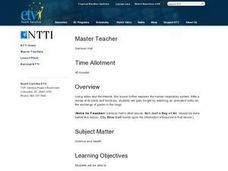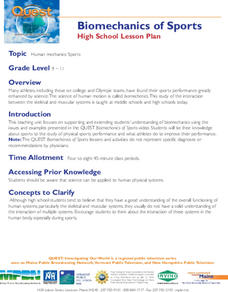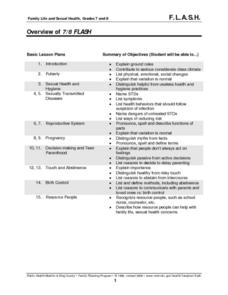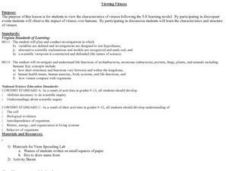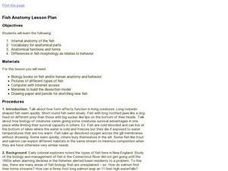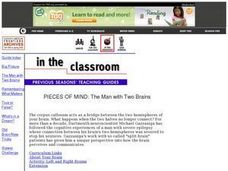Curated OER
The Cassini Robot
Pupils compare the functions of a robot to that of the human body. In this technology lesson, students identify the important components of the Cassini robot that would enable it to carry out space missions. They design and build their...
Curated OER
Modeling Breathing Action
Students create a model to identify the parts of the human respiratory system. They explore the Functional Electrical Stimulation (FES) and its use as a breathing support strategy. Students explore reflex actions as an involuntary...
Curated OER
Biology Wordsearch
In this biology worksheet, students identify and locate various vocabulary terms found in a biology lesson. There are 39 biology terms located in the word search.
Curated OER
Cells All Around
Young scholars measure the size of an epithelial cell and to estimate the number of epithelial cells in a given area of the body. After watching a video on cells, student groups perform an experiment using a microscope to view some of...
Curated OER
Standard 4 Review Sheet-Key Ideas Biology-The Living Environment
In this living environment worksheet, young scholars answer a variety of questions about living organisms, the processes they go through to make food and break down food, absorb nutrients, and release toxins. They explain homeostasis,...
Curated OER
Human Heart Anatomy
Students identify the 4-chambers and major blood vessels of the heart and
construct a model of a 4-chamber heart. They sketch their model, identify the chambers/vessels, state the condition of the blood in each chamber/vessel, and...
Curated OER
HUMAN/ENVIRONMENT INTERACTIONS: CLIMATE
Students explore the various global climates and apply cultural adaptations of the peoples in various zones due to climate.
Curated OER
Bones: The Body's Support
In this bones worksheet, students compare the axial and the appendicular skeletons. Students also review the bone components. This worksheet has 6 matching, 8 short answer, 4 fill in the blank, and 6 true or false questions.
Curated OER
CO2 Blow Out!
Fifth graders determine that carbon dioxide is a gas given off during respiration and that oxygent is the gas that is absorbed during respiration. They determine the air capacity of the lungs.
Curated OER
Health/Wellness
Students role-play the role of an employee of the Center for Disease Control. In groups, they identify and discuss the functions of the major body systems and analyze their family tree. They watch a video about plagues and calculate...
Curated OER
Nerve Cell Informercials
Young scholars research the structure and function of the nervous system. They prepare a model or representation of neural transmission. Students create an infomercial about nerve cells.
Curated OER
Non-nutrients: Fiber and Water
Students will identify the sources and function of carbohydrates and fiber and apply appropriate food preparation techniques.
Curated OER
Biomechanics of Sports
Students study biomechanics. They apply their understanding of sports to determine what athletes do to improve their performance. They participate in a series of lessons and activities.
Curated OER
Getting Up the Nerve
Students examine the basics of the nervous system through an interactive program. They discover how the brain is linked to muscle movement. They can test cells through the interactive program to see how it reacts to different stimuli.
Curated OER
FLASH
Students Distinguish among assertive, aggressive, passive and manipulative behaviors,Describe consequences of each,Formulate an assertive request,Describe how it feels to risk rejection. Students Describe how human immunodeficiency virus...
Curated OER
Viewing Viruses
Pupils view the characteristics of viruses following the 5-E learning model. By participating in discrepant events Students observe the impact of viruses over humans. By participating in discussion pupils examine the characteristics and...
Curated OER
Fish Anatomy
Students identify and interpret the internal anatomy of the fish. They also identify and define vocabulary for anatomical parts and anatomical functions and forms. Finally, students identify and interpret the differences in fish...
Curated OER
Animal Adaptations
students in groups to work on bulletin board, making a list of animal adaptations. They write an example of each body covering and find pictures of animals with these coverings. They mount pictures and label the covering. They should be...
Curated OER
Diversity And Adaptations Of Organisms
Seventh graders demonstrate the processes of science by posing questions and investigating phenomena through language, methods and instruments of science. They study the body features or systems of several animals.
Curated OER
The Skeleton Within
Fourth graders explore the bones, joints, and other attributes of the skeletal system.
Curated OER
Inside Information
Learners explore two pathways for information through the nervous system. The pathways for involuntary action or reflex and voluntary responses are built and related to the element of choice.
Curated OER
Cancer: A Crisis of the Cells
Students analyze cancer data represented in graphs and charts. They describe the changes in cell structure and function as the result of cancer. They also examine phenomenas that are believed to cause cancer.
Curated OER
Left and Right Brains
Students research the part of the brain known as the corpus callosum. The part of the brain that connects the left and right brain, students investigate its functions and how data passes from one side to another.
Curated OER
Hunger/ Nutrition
Seventh graders investigate nutrients and nutrition to determine what types of food the body needs for energy. They study each type of nutrient and why it is important to the body. They determine what a balanced diet is by completing the...








